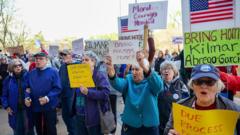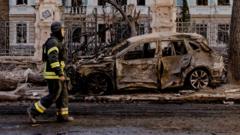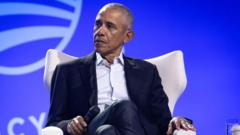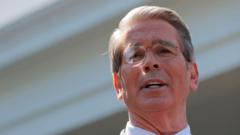In a recent proclamation, former President Donald Trump laid a portion of the blame for the ongoing Ukraine conflict squarely on the shoulders of Ukrainian President Volodymyr Zelensky, amid escalating concerns over civilian casualties.
Trump: Zelensky Shares Responsibility for Ukraine War Casualties
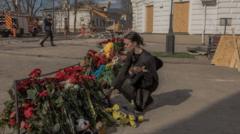
Trump: Zelensky Shares Responsibility for Ukraine War Casualties
Trump's controversial remarks place blame on Ukraine's president amidst deepening tensions in the region.
Trump's comments came during a meeting at the White House where he was discussing the ramifications of the war on both domestic and international fronts. He accused Zelensky of participating in the ongoing tragedy, asserting that significant blame should also fall on current and past U.S. administrations.
During his address, Trump remarked, “When you start a war you got to know you can win,” having juxtaposed Zelensky’s leadership with that of Russian President Vladimir Putin and President Joe Biden, whom he claimed also bore responsibility for the billions of dollars spent and the ensuing chaos. The remarks emerged following a harrowing Russian missile attack in the Ukrainian city of Sumy, which resulted in the deaths of dozens of civilians.
As a follow-up to the strike that claimed at least 35 lives and injured more than 100 others, Trump condemned the military assault as a “mistake.” However, his claim that “millions of people” had died as a result of the actions of him and the other two leaders has drawn criticism, as estimates suggest the actual toll is in the hundreds of thousands.
Trump expressed doubts over Zelensky’s negotiating abilities, implying that Ukraine’s pursuit of military assistance was misguided. His comments reignited tensions between him and Zelensky, stemming from their previous confrontation in Washington earlier this year.
In a response to the situation, Zelensky called upon Trump to visit Ukraine before making any decisions regarding negotiations with Russia, emphasizing the need for firsthand appreciation of the war's realities.
While Trump indicated a desire to “stop the killing,” he did not expand upon potential strategies or next steps. The ongoing fallout from the discussion emphasizes the complexity and challenges within the geopolitical landscape, particularly as Europe continues to grapple with the effects of the conflict.
As the narrative unfolds, observers remain keenly interested in both the humanitarian crisis at hand and the political maneuvers in light of the staggering loss of life and ongoing destruction.
During his address, Trump remarked, “When you start a war you got to know you can win,” having juxtaposed Zelensky’s leadership with that of Russian President Vladimir Putin and President Joe Biden, whom he claimed also bore responsibility for the billions of dollars spent and the ensuing chaos. The remarks emerged following a harrowing Russian missile attack in the Ukrainian city of Sumy, which resulted in the deaths of dozens of civilians.
As a follow-up to the strike that claimed at least 35 lives and injured more than 100 others, Trump condemned the military assault as a “mistake.” However, his claim that “millions of people” had died as a result of the actions of him and the other two leaders has drawn criticism, as estimates suggest the actual toll is in the hundreds of thousands.
Trump expressed doubts over Zelensky’s negotiating abilities, implying that Ukraine’s pursuit of military assistance was misguided. His comments reignited tensions between him and Zelensky, stemming from their previous confrontation in Washington earlier this year.
In a response to the situation, Zelensky called upon Trump to visit Ukraine before making any decisions regarding negotiations with Russia, emphasizing the need for firsthand appreciation of the war's realities.
While Trump indicated a desire to “stop the killing,” he did not expand upon potential strategies or next steps. The ongoing fallout from the discussion emphasizes the complexity and challenges within the geopolitical landscape, particularly as Europe continues to grapple with the effects of the conflict.
As the narrative unfolds, observers remain keenly interested in both the humanitarian crisis at hand and the political maneuvers in light of the staggering loss of life and ongoing destruction.

